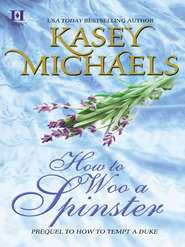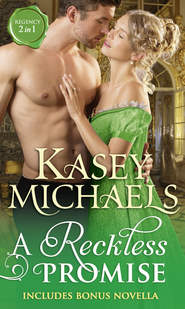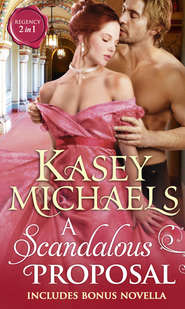По всем вопросам обращайтесь на: info@litportal.ru
(©) 2003-2025.
✖
Beloved Wolf
Автор
Год написания книги
2019
Настройки чтения
Размер шрифта
Высота строк
Поля
That had hurt. Come to her senses? Is that what he thought? That she’d lost her senses? Didn’t he understand? Didn’t anyone understand?
She’d lost a lot more than her “senses.”
When her dad had come into the room and gathered her into his arms, Sophie had told him what Meredith had said. She shouldn’t have done that, really, she shouldn’t have. But the loss she felt was so great, the hurt so overwhelming, that she hadn’t been able to keep the truth from her father—the truth that her mother, her own mother, now considered her disfigured and a total loss.
“She’s sick, baby,” Joe had said to her, his words sounding sad and tired and eerily hollow. “Ever since the accident. Something happened. Something changed her. You just have to remember how she was, baby. We all have to remember that, remember how she once loved us.”
That was when Sophie had gotten herself back under control. She couldn’t bear to hear the defeat in her father’s voice, the deep sadness that had to have been slowly destroying him these past nine years.
Sophie had hugged him, kissed him and promised to remember, to hold on to the memories of the good days. She listened as he discussed the physical therapy she’d begin in Prosperino in a few days, the surgery she’d have in less than five months, to minimize her scar.
She’d agreed with him on everything, assured him she was all right, and watched after him as he left her room, his large frame stooped, his feet dragging.
Her impulsively formed plan to leave the ranch the next morning embarrassed her as she watched her father. How could she leave him? How could she have stayed away so long? Why had she stayed away so long? Because of Meredith? Perhaps.
But there was another reason, and Sophie knew it.
She watched now as that reason walked toward her through the soft patches of misty yellow drifting down from the vapor lights placed around the stables.
He walked with his head down, his face hidden by that ever-present dusty tan cowboy hat that seemed so much a part of him. He had his hands stuffed deep in his jean pockets and kicked a stone along the drive with the tip of his worn cowboy boots. The lone wolf, prowling his nocturnal territory.
Sophie’s stomach muscles clenched as she watched him approach, drank in the sight of him. Long and lean, his shoulders broad, his waist and hips narrow, his straight legs wrapped tight in faded jeans. He moved gracefully, unaware of his natural grace.
When she had been a kid, she’d marveled at his shoulder-length hair, black as night, straight as sticks, and the perfect frame for his tanned, brooding face, his sparkling green eyes, the intriguing slashes that appeared in his cheeks at his rare smiles.
River had figured in all her dreams for just about as long as she could remember having dreams. The barely tamed rebel, the exotic creature with a Native American mother and a father who had tried, and failed, to destroy him. The misfit. The one person on the ranch who didn’t immediately love her, think she was wonderful, do anything and everything to please her.
A creature of light, Sophie had been drawn to his darkness, his secrets. He spoke to the horses, whispered to them, and they listened. He stood toe to toe with her father, the only person Sophie had ever seen do that, and never backed down. Never backed down from anyone, from anything.
He was wild, and wonderful, and Sophie would have done anything for his smile, a single word of praise, to have him notice her, talk to her, let her into at least a small slice of his life.
No, Sophie knew that she hadn’t stayed away from the ranch because her family had changed while she was gone at college. She’d gone, and stayed away, because River hadn’t wanted her.
Everything she had done since the night he had kissed her then pushed her away, told her to go away, had been to hurt River. Her choice of career. Her engagement to Chet Wallace, who was as different from River James as a pin-striped three-piece suit was from a battered cowboy hat pushed down low over all-seeing green eyes.
River had always been strong, definitely stronger than her. Because he had stayed, he had taken the good with the bad, raised himself above a truly tragic childhood. Stayed to give back for all he’d been given.
She watched as he lifted his head and saw her sitting on the bench. His step faltered for a moment, and then he walked toward her with his lazy, rolling gait, sat down beside her in the space she’d left for him—on her right, so that he couldn’t see her scar. Not that he could see much more than form and shadow in this spot just out of the reach of any of the vapor lights, but she just felt more comfortable with her left cheek hidden.
“Evening, Sophie. Welcome home,” he said, the sound of his voice soft, smooth. It was a voice that could soothe a frightened horse, spin a young girl wonderful stories of Native American life as it had been before the white man came. A voice that could whisper, “I want you. God, Sophie, how I want you.”
Sophie just nodded, her tongue cleaving to the roof of her suddenly dry mouth. He smelled of soap and shaving cream and something else, something undefinable, but definitely male. All male, all man.
“They were waiting for you up at the house,” he said, leaning back against the side of the stables, his long legs stretched out in front of him, his head still bent forward, so that he didn’t bang the rim of his hat against the wall. “Dinner’s up.”
“I know, Riv,” she said, wondering if he could condense his sentences anymore, make them shorter, more clipped. It was as if he didn’t want to talk to her at all. “I asked Inez to save me something in the refrigerator, in case I get hungry later. Riv, why did you tell me to leave?”
The moment the words were out of her mouth, she gasped and clapped a hand over her mouth. Had she gone mad? How could she have asked that?
He didn’t react, didn’t flinch. It was if he’d been expecting the question, maybe waiting for it. Waiting ten years for her to ask.
“It was time for you to go,” he said, taking off his hat and placing it beside him on the bench. “Time for you to grow up, see the world, find out who Sophie Colton was.” He turned toward her and tipped his head as he looked at her in the darkness. “Did you find her, Sophie? Did you like her?”
“I thought I did,” she answered truthfully. “As long as I hated you, I liked myself.”
River chuckled low in his throat. “That’s my Sophie. Give her a good mad, and she can bring the world to its knees.”
She smiled, in spite of herself. “You remember that? You remember how I wanted to conquer the world?”
“Rule the world, I think it was, actually,” River corrected her. “Right after you flew to Mars, cured cancer and invented a pimple cream that really worked—which would have been just before you won the Pulitzer Prize. Yes, I remember. You had big-time dreams, Sophie. Dreams that were a lot bigger than this ranch.”
“I was a kid, Riv,” she shot back angrily. “What the hell did I know about life?”
“Well, Sophie, that’s just it. You didn’t know about life, did you? But you deserved a chance to find out what was out there.”
Sophie sniffed, shook her head. “What’s out there, Riv, is doing homey, tearjerker ads for health insurance companies who withhold treatment to their customers, writing jingles for pimple creams that don’t work…and a world that’s a lot bigger, and stronger, and meaner than I ever could have imagined.” Her voice broke slightly. “It knocked me down, Riv. The world out there knocked me down.”
“And so now you’re home again. Damn, Sophie. How do you sit there looking so comfortable, with your tail tucked between your legs like that?”
She turned sideways on the bench and glared at him. “You son of a— Damn it, Riv, shut up!” How did he do it? How could he make her so mad?
He reached up and scratched at a spot just below his left ear. “Hasn’t worked any miracles for you yet, has it, Soph? Coming home, that is. Joe told me about Meredith’s version of welcoming the prodigal back into the fold this afternoon. Nice. Very nice. Very Meredith.”
“I’m not going to let her get to me,” Sophie declared, trying to believe what she said, trying to tell herself that her mother’s words hadn’t hurt, didn’t still hurt. “She’s sick. Dad says so. The car accident did something—she banged her head, jiggled her brains, shook up her personality. Or maybe it’s…well, maybe it’s the changes. Some women have real problems as they go through menopause.”
“Wrote up a hormone replacement ad for that company of yours, did you?” River said, his even white teeth visible in the soft glow of light as he grinned at her. “Wouldn’t it be great if we could all talk in advertising slogans and actually believe all the promises? A thirty-second fix for everything from bad hair days to world peace, if only you used the right product, picked the right party, whatever. Do you do political ads, Sophie? I’ll bet you do. Making silk purses out of sows’ ears, and then ramming it all down the public’s throat. Very commendable.”
Sophie clenched her hands into fists. “If you’re all done making fun of what I chose to do with my career…?”
“All done? Nope. I’ve got a few more stored away somewhere, but I guess I’ll leave them there for now. But admit it, Sophie, I got your mind off that cheek you were keeping turned away from me until a few moments ago.”
She quickly lifted a hand to her cheek, turned her head. “You never did play fair, did you, Riv?” she asked, staring out into the night, blinking back tears. “I—I didn’t know you were so disappointed in the career I chose.”
“You were going to do the internship at Joe’s place in Texas, then major in Communications at college. Graduate, work at one of the television stations, or do investigative reporting for one of the Colton family newspapers. Be like your dad, one of the few men who have used public office, public responsibility, to really help people. Next thing I heard, you were making up slogans for tartar-reducing toothpaste, earning the big bucks, but selling out all your dreams. Hey, now that’s really making a contribution, isn’t it?”
“You don’t understand,” Sophie told him, once more forgetting about her scar, forgetting to hide that scar from River. “Those were dreams, Riv. Young girl dreams.”
“So you really enjoy your work?”
“Of course I enjoy my work!” Sophie exploded, grabbing at her cane and rising to her feet. “I love what I do!”
“Funny. That’s not what Rand told me.”
Sophie sat down again. “Rand? I—I don’t know what you mean.”
“Really? You know, Sophie, you didn’t use to lie to me.”
She bit her bottom lip for a moment, then asked, “What did Rand say?”











